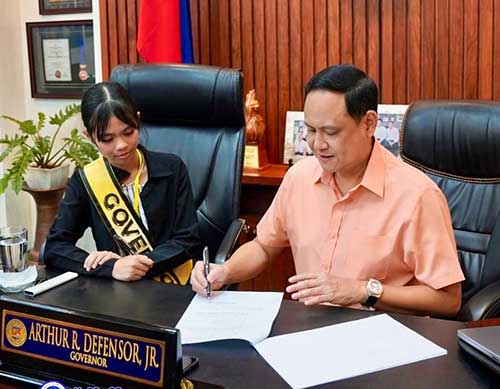
By Mariela Angella Oladive
The Iloilo provincial government, under the leadership of Governor Arthur R. Defensor Jr., officially launched the “Turista sa Barangay” program on August 13 through Executive Order No. 168, Series of 2024.
This initiative, part of the broader MoRProGRes (Movement for a Robust, Progressive, Globally Competitive, and Resilient Province of Iloilo), aims to transform local barangays into vibrant community venues for tourism events and activities, aligned with the Provincial Tourism Development Plan.
“The barangay is recognized as the frontline LGU in developing the tourism industry, serving as the community venue for tourism events and activities, as well as the established point of care for tourists of the Province,” the executive order states.
The program’s objectives include boosting investments, employment, and food security while enhancing health, social services, and public safety.
It adopts a barangay-focused approach, highlighting agriculture and food tourism, the enhancement of natural sites, and the preservation of cultural heritage.
Key strategies under the program involve upgrading agricultural facilities in Barangay Nanga, Pototan, and enhancing gardening programs in tourism-rich areas such as Bucari Pine Forest in Leon, Maasin Watershed in Daja, and the Jalaur Multipurpose Project Watershed Area.
The EO also proposes reforestation efforts across the province, the promotion of flower-bearing trees, and the development of social forestry projects.
Additionally, the program will develop “Kasadyahan sa Kabanwahanan,” a globally recognized festival highlighting the province’s tangible and intangible heritage, focusing on fun, food, and culture.
By targeting barangays with established tourism potential, the “Turista sa Barangay” program aims to increase tourist arrivals and enhance the overall tourism experience in Iloilo.
It will be a convergence initiative involving National Government Agencies (NGAs), Local Government Units (LGUs), Sangguniang Kabataan (SK), non-government organizations (NGOs), people’s organizations (POs), schools, academic institutions, and religious organizations. These groups will collaborate to implement national laws, local ordinances, and resolutions that support the development of the tourism industry.
The program will also align with the National Tourism Development Plan (NTDP), which aims to establish the Philippines as a sustainable, resilient, and competitive tourism powerhouse in Asia.




















